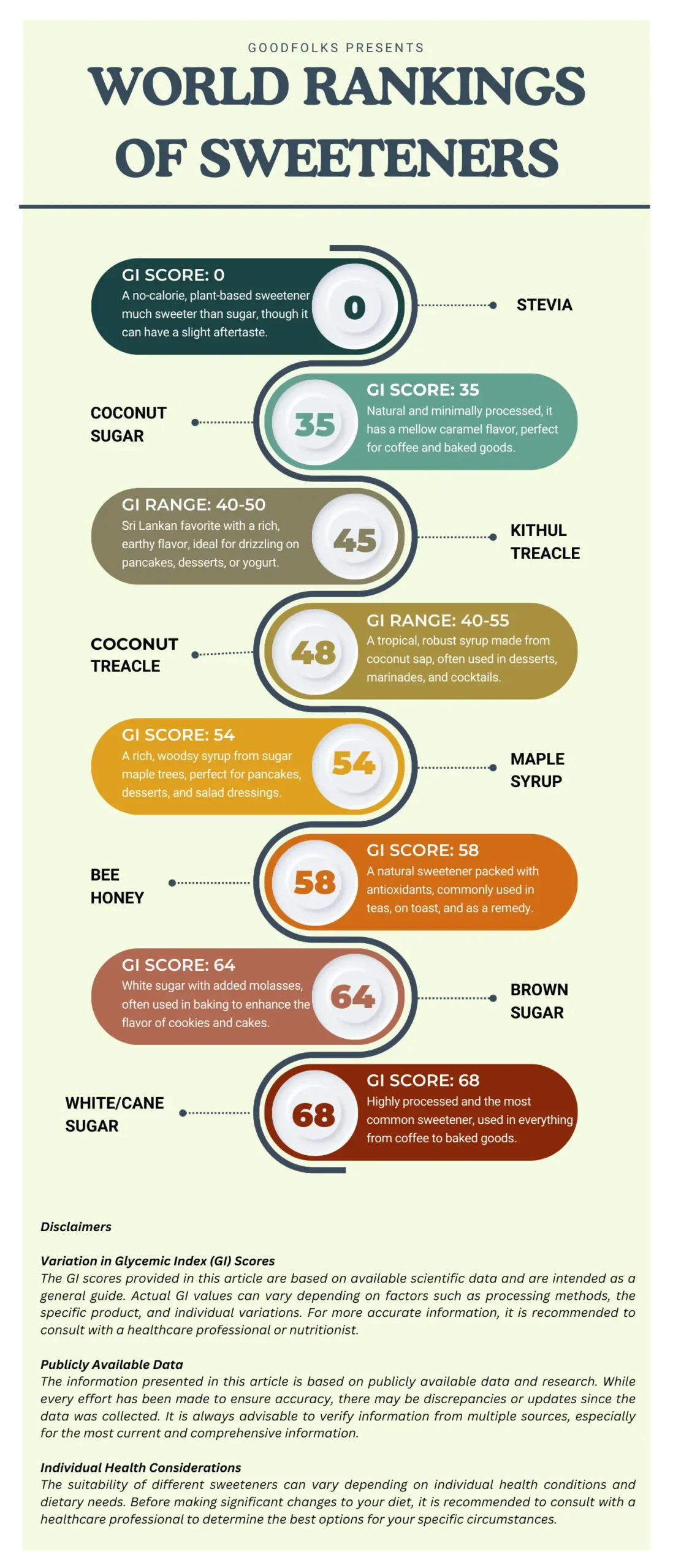Sugar has been a part of human history for centuries, sweetening everything from our morning tea to special desserts. But as we’ve come to learn, not all sweeteners are created equal. Some offer a slow and steady rise in blood sugar, while others are more like a sugar rollercoaster! Let’s explore some of the most popular sweeteners in the world today, ranked by their Glycemic Index (GI)—a scale that helps us understand how quickly a sweetener affects our blood sugar.

Stevia (GI = 0)
Stevia is the cool, laid-back friend of the sweetener world. With a GI score of zero, it doesn’t mess with your blood sugar at all. Stevia comes from the leaves of the Stevia rebaudiana plant, and while it’s much sweeter than sugar, it has no calories or carbs. It’s a favorite among people looking to cut sugar without losing the sweetness, often used in teas, smoothies, and baking. However, be warned: it has a slightly bitter aftertaste that takes some getting used to!
Coconut Sugar (GI = 35)
Coconut sugar is like the health-conscious sibling of refined sugar, but with a tropical twist. It’s made from the sap of the coconut palm, and its lower GI score of 35 makes it a favorite in many kitchens trying to go “natural” without going overboard. Coconut sugar’s mellow, caramel-like flavor pairs well with coffee, baked goods, and even oatmeal. It won’t cause a sugar spike as quickly as white sugar, but moderation is key—just because it’s lower GI doesn’t mean you can heap it on! Check out Goodfolks Organic Coconut Sugar
Kithul Treacle (GI = 40-50)
From the palm trees of Sri Lanka comes kithul treacle, a delicious syrup made from the sap of the kithul palm. With a GI score hovering between 40 and 50, it’s not too high, not too low, making it just right for those seeking a middle-ground sweetener. It has a rich, earthy flavor that pairs beautifully with pancakes, desserts, or even drizzled on yogurt. It’s a sweetener with tradition, used in Sri Lankan cuisine for centuries—definitely one to try if you’re after something unique! Check out Goodfolks Kithul Treacle.
Coconut Treacle (GI = 40-55)
Another treasure from the coconut palm, coconut treacle is like the more liquid version of coconut sugar. Its GI score is slightly higher than coconut sugar, ranging from 40 to 55, but it still beats out the high GI sweeteners. Coconut treacle has a deep, robust flavor, making it a fantastic addition to marinades, desserts, and even cocktails. Plus, it gives you that tropical feel, even if you’re miles away from the beach. Check out Goodfolks Organic Coconut Treacle.
Maple Syrup (GI = 54)
Maple syrup isn’t just for pancakes—it’s a versatile sweetener with a GI of 54. Made from the sap of sugar maple trees, this amber-colored syrup adds a rich, woodsy sweetness to everything from desserts to dressings. While it’s not the lowest on the GI scale, it offers a delicious alternative to refined sugar and brings a taste of the forest with it. Just remember, a little goes a long way!
Bee Honey (GI = 58)
Honey may seem like nature’s perfect sweetener, but with a GI score of 58, it can still send your blood sugar on a bit of a ride. However, its natural goodness—packed with antioxidants and other nutrients—makes it a popular choice for those who want something more wholesome than processed sugar. Use it in teas, drizzled over toast, or as a natural cough remedy. But be mindful, it’s sweeter than sugar, so you might need less than you think. Check out the range of Goodfolks Sri Lankan Bee Honey – considered to be amongst the most medicinal in the world.
Brown Sugar (GI = 64)
Brown sugar is really just white sugar with a tan—its molasses content gives it that distinctive flavor and color. With a GI score of 64, it’s slightly lower than its refined cousin, but not by much. You’ll often see it used in baking, especially for cookies and cakes where that deep, molasses flavor can shine. Just remember, it’s still sugar at heart, so use sparingly.
Refined White Cane Sugar (GI = 65)
Ah, the classic refined white cane sugar—the sweetener we all know and love (or love to hate). With a GI score of 65, it’s quick to spike blood sugar levels, making it less ideal for those who want to keep things steady. White sugar is highly processed, making it the go-to for everything from cakes to coffee. While it may taste familiar, it’s not exactly the best option for keeping your energy levels balanced throughout the day.
The Sweet Conclusion
When it comes to sweeteners, it’s not just about taste—it’s also about how they affect your body. Lower GI sweeteners like stevia and coconut sugar tend to cause a slower, more gradual rise in blood sugar, which can be a good thing for those watching their glucose levels. But just because a sweetener is natural or has a lower GI doesn’t mean it should be used without limits. After all, balance is key in all things, including our sweet treats!
Sources
- Foster-Powell, K., Holt, S. H., & Brand-Miller, J. C. (2002). International table of glycemic index and glycemic load values. American Journal of Clinical Nutrition, 76(1), 5-56. https://pubmed.ncbi.nlm.nih.gov/12081815/
- Ganda, O. P., Rossini, A. A., & Like, A. A. (1979). Studies on the relationship of the glycemic index to glycemic control in diabetes mellitus. The New England Journal of Medicine, 300(14), 796-801.
- Harvard Health Publishing. (2019). Glycemic Index and Glycemic Load for 100+ Foods. Harvard Medical School. https://www.health.harvard.edu/diseases-and-conditions/glycemic-index-and-glycemic-load-for-100-foods
- Livesey, G., Taylor, R., Hulshof, T., & Howlett, J. (2008). Glycemic response and health: A systematic review and meta-analysis: Relations between dietary glycemic properties and health outcomes. The American Journal of Clinical Nutrition, 87(1), 258S-268S. https://pubmed.ncbi.nlm.nih.gov/18175766/
#LowGI #UnrefinedNaturalSweeteners #stevia #coconutsugar #coconutsyrup #coconuttreacle #kithultreacle #maplesyrup #beehoney #brownsugar #whitesugar




